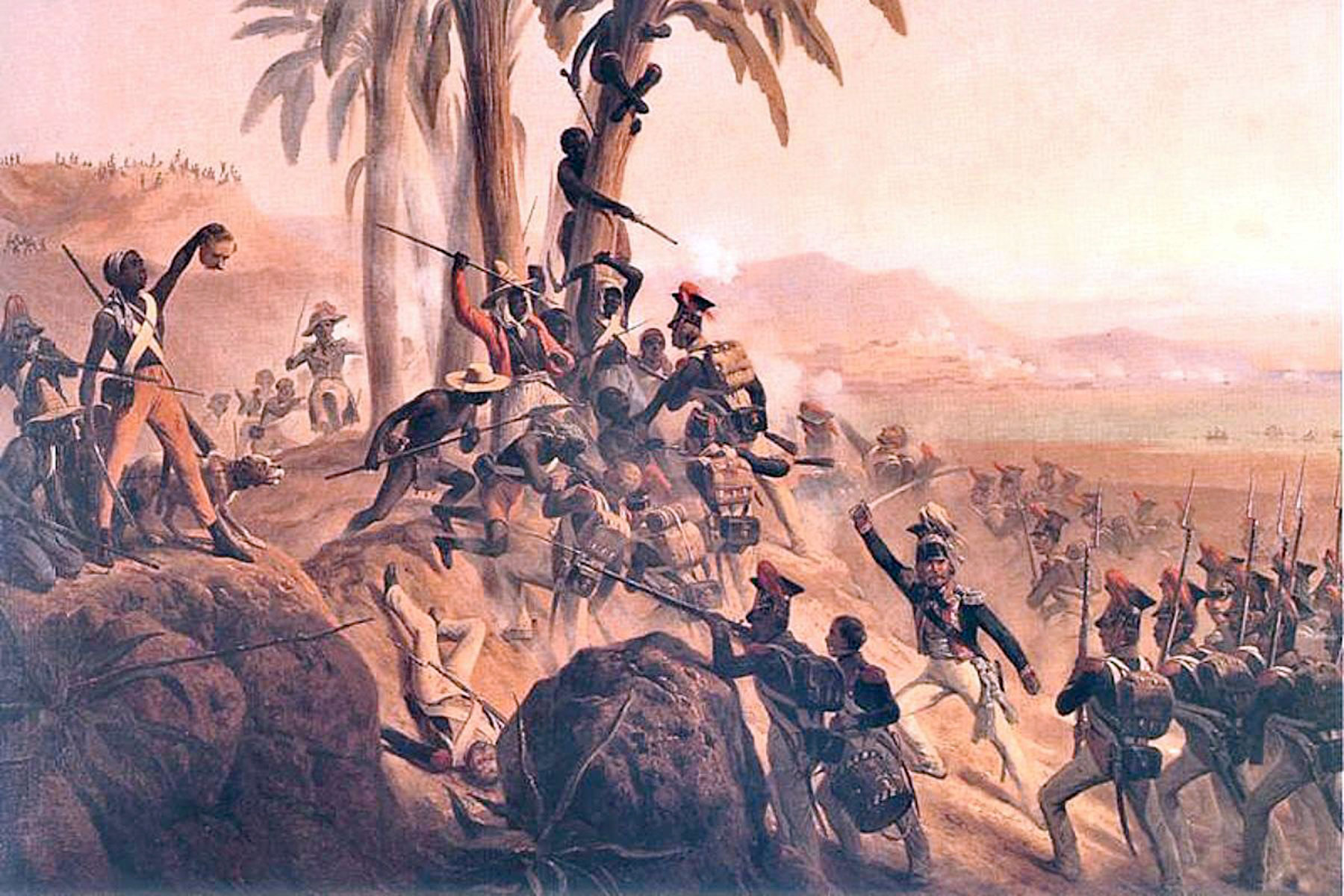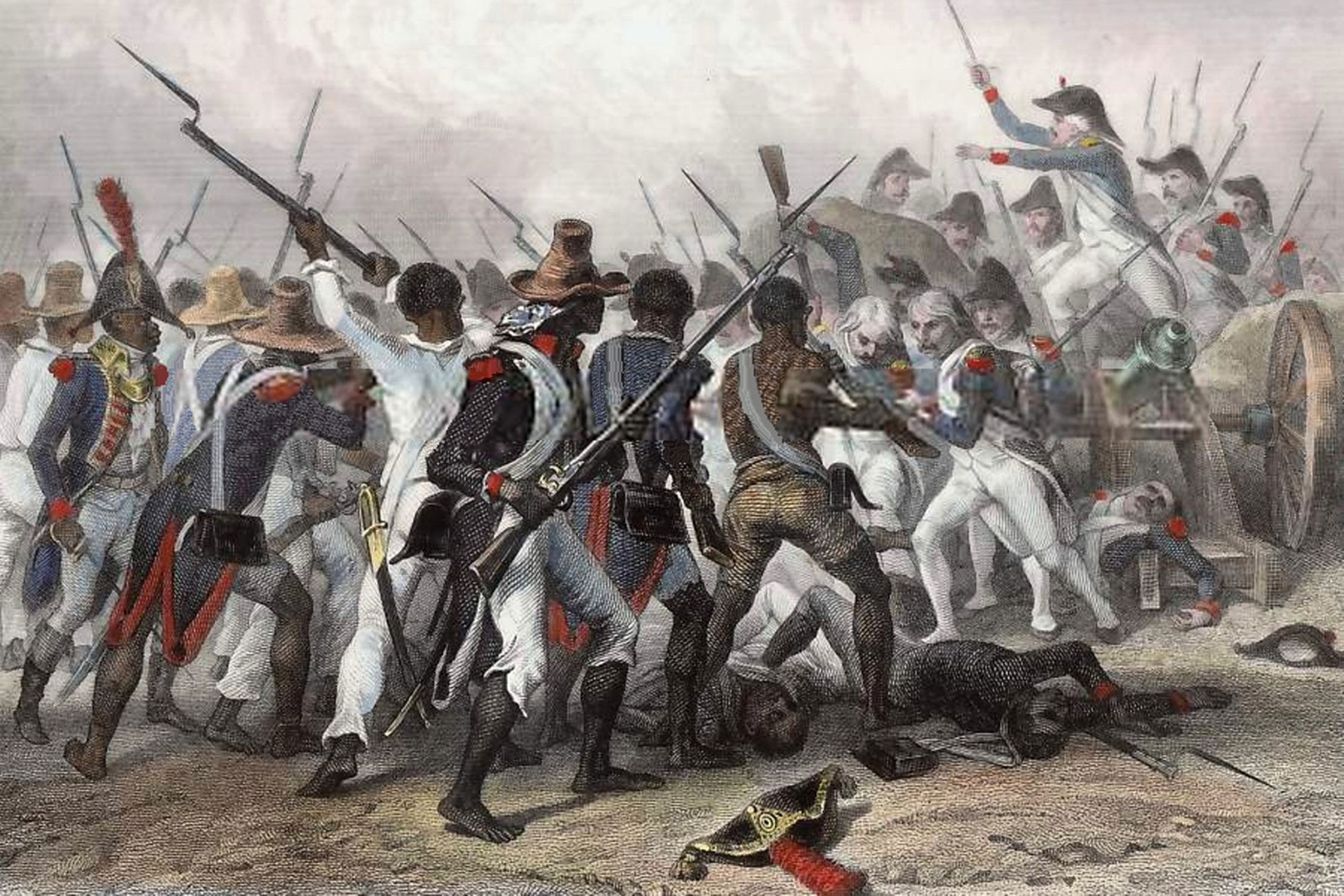
The Haitian Revolution is a defining moment in Black history. When the small group of Haitian freedom fighters defeated Napoleon, this colossal victory shifted the world’s scales from Europe’s colonial rule to Haiti’s Black power and dominance.
Under Napoleon’s military leadership, France became a ruthless powerhouse that destroyed virtually every opponent they faced. His mighty army effortlessly won 52 battles and incited fear in all potential enemies.
For a group of enslaved folks to consider taking on Napoleon’s forces was literally like David challenging Goliath. But the people had been pushed to the breaking point.
During the 1700s, France prospered off the labor of enslaved Black people. Haiti, formerly Saint Domingue, stood as one of the wealthiest colonies in the world because its resource-rich land produced sugar, coffee, and indigo.
Saint Domingue had an enslaved population of nearly 500,000 people with a long history of small rebellions against white plantation owners. When the enslaved Blacks began talks of independence among themselves, the plantation owners had no idea what they were in for.
After France adopted the “Declaration of the Rights of Man,” which ensured “Men are born and remain free and equal in rights,” the enslaved population began to organize and set the stage for what would be the largest revolt of all-time.
There was a constant arrival of new Africans to Haiti. Therefore, the enslaved Blacks maintained a solid connection to languages and traditions of West Africa. They used this to their advantage.
In August 1791, Dutty Boukman, a formerly enslaved man, led a Vodou ceremony where he demanded all Blacks “cast aside the image of the God of the oppressors.” Once the Blacks in Haiti embraced their traditional African spiritual practices, they were prepared to fight for freedom.
The freedom fighters united under African spirituality and called on ancestral forces to defeat Napoleon’s troops. “Voodoo enabled the slaves to break away psychologically from the very real and concrete chains of slavery and to see themselves as independent beings; in short it gave them a sense of human dignity and enabled them to survive.”
Towards the end of 1791, an all-out civil war erupted as Toussaint L’Overture, known as “The Black Napoleon,” emerged as the leader of the freedom fighters that took control of a significant portion of the island. Violent bloodbaths between the freedom fighters and the French and British armies resulted in over 100,000 deaths.
Battles ensued for nearly 10 years until Toussaint and his men took over the entire island of Saint Domingue. Despite suffering repeated losses, France did not give up. Napoleon Bonaparte sent nearly 50,000 troops to Saint Domingue to kidnap Toussaint, impose their will on the freedom fighters, and reinstate their slave rule.
The French army captured Toussaint who later died in prison, but his generals stepped up and led a group of revolutionaries to victory against Napoleon’s troops in 1803. With this victory, the revolutionaries changed the island’s name from Saint Domingue to “Haiti” and declared its independence from France.
Haiti became the first country ever founded entirely by formerly enslaved Black people, the second country to defeat Europeans for freedom, and the first country to abolish slavery in the Western hemisphere.
When word traveled to America that Haiti became the world’s first Black republic, Thomas Jefferson panicked and grew fearful that enslaved Blacks in the U.S. would catch wind of the uprising and revolt themselves.
In one of Jefferson’s letters, he wrote “I become daily more and more convinced that all the West India Island will remain in the hands of the people of colour, and a total expulsion of the whites sooner or later will take place.”
The U.S. and other Western countries did everything in their power to punish Haiti for revolting. It took over 20 years for France to formally recognize Haiti’s independence.
The Haitians’ victory shattered all of France’s hopes of establishing an empire in the Americas and forced them to sell Louisiana to America in the Louisiana Purchase deal.
What’s more startling is that France made Haiti pay reparations totaling in the billions before they were totally free. It took Haiti 122 years to pay off their debt (1825-1947).
Western countries never forgave Haiti for fighting back. They placed harsh sanctions and embargo taxes on Haiti that still exist today, making trade extremely expensive and nearly impossible. Unfortunately, it seems like this is the price they had to pay for their freedom.
The 2010 earthquake in Haiti put a spotlight on the country’s poverty, but the rest of the world turning its back on Haiti does not take away from the centuries of struggle, progress, and independence. A small group of revolutionaries made it possible for hundreds of thousands of people to live free of enslavement.
The Haitian revolution is one of the greatest examples of Black people coming together against a common enemy and prevailing. Nobody deserves to live a life of servitude and this great triumph exemplifies our resilience and should inspire all of us to never settle for less than what we deserve.
To learn more of the history of the Haitian revolution, read The Irritated Genie: An Essay On The Haitian Revolution or the new film 1804: The Hidden History Of Haiti, from Tariq Nasheed, the producer of the Hidden Colors series.
PushBlack Now
Originally published on PushBlack Now as The truth about Haiti will make you see freedom differently
Please help PushBlack brings readers inspiring and unbiased Black history stories that can change the world by giving a small donation.















